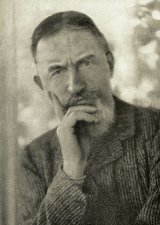Pygmalion Page #27
Pygmalion is a play by George Bernard Shaw, named after a Greek mythological figure. It was first presented on stage to the public in 1913. In ancient Greek mythology, Pygmalion fell in love with one of his sculptures, which then came to life.
On the piteous spectacle of the pair spending their evenings in shorthand schools and polytechnic classes, learning bookkeeping and typewriting with incipient junior clerks, male and female, from the elementary schools, let me not dwell. There were even classes at the London School of Economics, and a humble personal appeal to the director of that institution to recommend a course bearing on the flower business. He, being a humorist, explained to them the method of the celebrated Dickensian essay on Chinese Metaphysics by the gentleman who read an article on China and an article on Metaphysics and combined the information. He suggested that they should combine the London School with Kew Gardens. Eliza, to whom the procedure of the Dickensian gentleman seemed perfectly correct (as in fact it was) and not in the least funny (which was only her ignorance) took his advice with entire gravity. But the effort that cost her the deepest humiliation was a request to Higgins, whose pet artistic fancy, next to Milton's verse, was calligraphy, and who himself wrote a most beautiful Italian hand, that he would teach her to write. He declared that she was congenitally incapable of forming a single letter worthy of the least of Milton's words; but she persisted; and again he suddenly threw himself into the task of teaching her with a combination of stormy intensity, concentrated patience, and occasional bursts of interesting disquisition on the beauty and nobility, the august mission and destiny, of human handwriting. Eliza ended by acquiring an extremely uncommercial script which was a positive extension of her personal beauty, and spending three times as much on stationery as anyone else because certain qualities and shapes of paper became indispensable to her. She could not even address an envelope in the usual way because it made the margins all wrong. Their commercial school days were a period of disgrace and despair for the young couple. They seemed to be learning nothing about flower shops. At last they gave it up as hopeless, and shook the dust of the shorthand schools, and the polytechnics, and the London School of Economics from their feet for ever. Besides, the business was in some mysterious way beginning to take care of itself. They had somehow forgotten their objections to employing other people. They came to the conclusion that their own way was the best, and that they had really a remarkable talent for business. The Colonel, who had been compelled for some years to keep a sufficient sum on current account at his bankers to make up their deficits, found that the provision was unnecessary: the young people were prospering. It is true that there was not quite fair play between them and their competitors in trade. Their week-ends in the country cost them nothing, and saved them the price of their Sunday dinners; for the motor car was the Colonel's; and he and Higgins paid the hotel bills. Mr. F. Hill, florist and greengrocer (they soon discovered that there was money in asparagus; and asparagus led to other vegetables), had an air which stamped the business as classy; and in private life he was still Frederick Eynsford Hill, Esquire. Not that there was any swank about him: nobody but Eliza knew that he had been christened Frederick Challoner. Eliza herself swanked like anything. That is all. That is how it has turned out. It is astonishing how much Eliza still manages to meddle in the housekeeping at Wimpole Street in spite of the shop and her own family. And it is notable that though she never nags her husband, and frankly loves the Colonel as if she were his favorite daughter, she has never got out of the habit of nagging Higgins that was established on the fatal night when she won his bet for him. She snaps his head off on the faintest provocation, or on none. He no longer dares to tease her by assuming an abysmal inferiority of Freddy's mind to his own. He storms and bullies and derides; but she stands up to him so ruthlessly that the Colonel has to ask her from time to time to be kinder to Higgins; and it is the only request of his that brings a mulish expression into her face. Nothing but some emergency or calamity great enough to break down all likes and dislikes, and throw them both back on their common humanity--and may they be spared any such trial!--will ever alter this. She knows that Higgins does not need her, just as her father did not need her. The very scrupulousness with which he told her that day that he had become used to having her there, and dependent on her for all sorts of little services, and that he should miss her if she went away (it would never have occurred to Freddy or the Colonel to say anything of the sort) deepens her inner certainty that she is "no more to him than them slippers", yet she has a sense, too, that his indifference is deeper than the infatuation of commoner souls. She is immensely interested in him. She has even secret mischievous moments in which she wishes she could get him alone, on a desert island, away from all ties and with nobody else in the world to consider, and just drag him off his pedestal and see him making love like any common man. We all have private imaginations of that sort. But when it comes to business, to the life that she really leads as distinguished from the life of dreams and fancies, she likes Freddy and she likes the Colonel; and she does not like Higgins and Mr. Doolittle. Galatea never does quite like Pygmalion: his relation to her is too godlike to be altogether agreeable.
Translation
Translate and read this book in other languages:
Select another language:
- - Select -
- 简体中文 (Chinese - Simplified)
- 繁體中文 (Chinese - Traditional)
- Español (Spanish)
- Esperanto (Esperanto)
- 日本語 (Japanese)
- Português (Portuguese)
- Deutsch (German)
- العربية (Arabic)
- Français (French)
- Русский (Russian)
- ಕನ್ನಡ (Kannada)
- 한국어 (Korean)
- עברית (Hebrew)
- Gaeilge (Irish)
- Українська (Ukrainian)
- اردو (Urdu)
- Magyar (Hungarian)
- मानक हिन्दी (Hindi)
- Indonesia (Indonesian)
- Italiano (Italian)
- தமிழ் (Tamil)
- Türkçe (Turkish)
- తెలుగు (Telugu)
- ภาษาไทย (Thai)
- Tiếng Việt (Vietnamese)
- Čeština (Czech)
- Polski (Polish)
- Bahasa Indonesia (Indonesian)
- Românește (Romanian)
- Nederlands (Dutch)
- Ελληνικά (Greek)
- Latinum (Latin)
- Svenska (Swedish)
- Dansk (Danish)
- Suomi (Finnish)
- فارسی (Persian)
- ייִדיש (Yiddish)
- հայերեն (Armenian)
- Norsk (Norwegian)
- English (English)
Citation
Use the citation below to add this book to your bibliography:
Style:MLAChicagoAPA
"Pygmalion Books." Literature.com. STANDS4 LLC, 2025. Web. 12 Jan. 2025. <https://www.literature.com/book/pygmalion_78>.




Discuss this Pygmalion book with the community:
Report Comment
We're doing our best to make sure our content is useful, accurate and safe.
If by any chance you spot an inappropriate comment while navigating through our website please use this form to let us know, and we'll take care of it shortly.
Attachment
You need to be logged in to favorite.
Log In